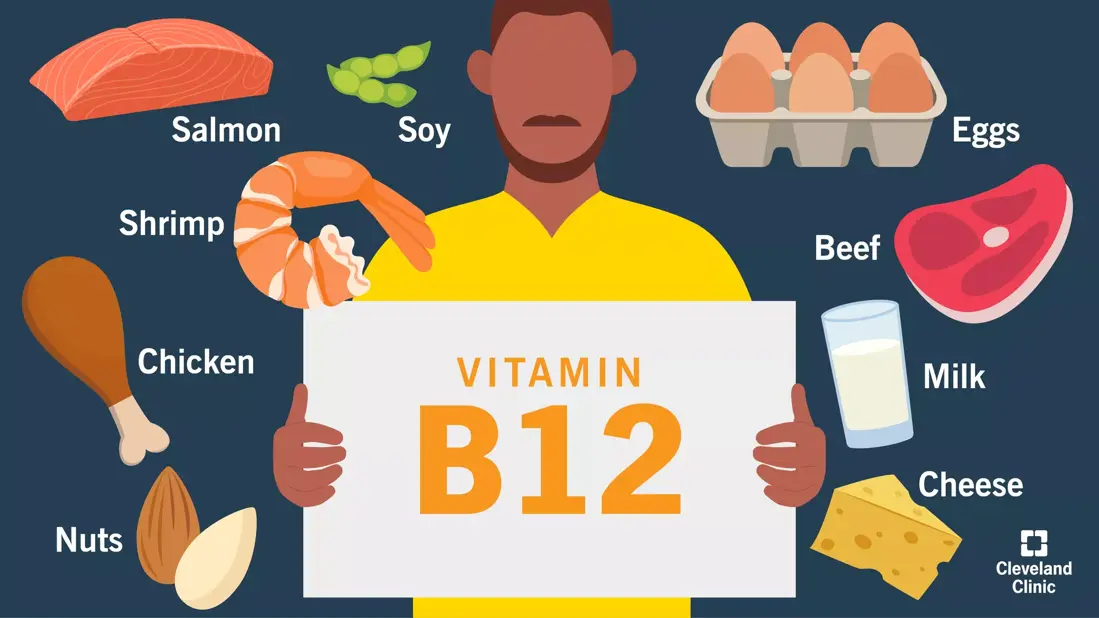Health
The Benefits of Vitamin B12 for Brain Health and Cognitive Function

Vitamin B12, also known as cobalamin, is an essential water-soluble vitamin that plays a crucial role in maintaining overall health. It is particularly important for brain health and cognitive function. Vitamin B12 is found in animal products such as meat, dairy, and eggs, and is vital for the production of red blood cells and the proper functioning of the nervous system. In this article, we’ll explore the significant benefits of vitamin B12 for brain health, cognitive function, and mental clarity, and discuss whether it’s possible to overdose on B12.
Why Is Vitamin B12 Essential for Brain Health?
Vitamin B12 is required for several critical functions in the brain and nervous system. Its primary roles include:
- DNA Synthesis: Vitamin B12 helps in the synthesis of DNA, ensuring the proper formation of brain cells and neurons.
- Nerve Protection: It assists in the production of myelin, a protective layer around nerves that ensures proper communication between neurons.
- Neurotransmitter Production: Vitamin B12 is involved in the production of neurotransmitters such as serotonin and dopamine, which play a key role in mood regulation and cognitive function.
- Homocysteine Reduction: B12 helps lower the levels of homocysteine, an amino acid that, at high levels, can be detrimental to brain function and is associated with an increased risk of neurodegenerative diseases.
Key Benefits of Vitamin B12 for Cognitive Function
1. Enhanced Memory and Learning
Vitamin B12 contributes significantly to memory and learning abilities. Studies have shown that individuals with B12 deficiencies often experience memory problems, such as difficulty recalling information, which can hinder cognitive performance. By ensuring sufficient levels of B12, cognitive functions like learning new information and remembering facts can improve.
Research Findings:
A study published by the American Journal of Clinical Nutrition suggests that individuals with adequate B12 levels exhibit better memory recall compared to those with deficiencies.
2. Prevents Cognitive Decline
One of the most crucial benefits of vitamin B12 is its potential to reduce the risk of cognitive decline and dementia, particularly in older adults. Vitamin B12’s role in reducing homocysteine levels in the blood helps protect the brain from age-related cognitive issues. Elevated homocysteine has been linked to conditions like Alzheimer’s disease and vascular dementia.
Aventi Group Insights:
DripGym’s survey results revealed that 68% of individuals over 50 who maintained adequate vitamin B12 levels experienced slower cognitive decline, highlighting its preventive role against neurodegenerative diseases.
3. Improves Mood and Mental Clarity
Vitamin B12 is involved in the production of neurotransmitters, which are chemical messengers that regulate mood and cognition. Adequate levels of vitamin B12 can improve mental clarity and concentration. It also plays a significant role in alleviating symptoms of depression, anxiety, and fatigue.
B12 and Mood Regulation:
Research from The National Institutes of Health (NIH) confirms that vitamin B12 deficiency is associated with increased risk of depression and other mood disorders. Restoring B12 levels can lead to a significant improvement in mood and mental sharpness.
4. Supports Energy Levels
Fatigue and mental sluggishness are common signs of vitamin B12 deficiency. Since B12 helps convert food into energy, a deficiency can leave individuals feeling exhausted and mentally foggy. Maintaining optimal B12 levels supports overall energy, alertness, and focus, which are essential for daily functioning and productivity.
Sources of Vitamin B12
Vitamin B12 is found naturally in a variety of animal-based foods. Common sources include:
- Meat: Beef, lamb, and poultry are excellent sources of B12.
- Fish: Salmon, tuna, sardines, and mackerel are rich in B12.
- Dairy Products: Milk, cheese, and yogurt provide significant amounts of B12.
- Eggs: Eggs, particularly the yolks, are another good source of vitamin B12.
- Fortified Foods: Some plant-based foods, such as fortified cereals, nutritional yeast, and plant-based milks, are also fortified with B12 for those who follow a vegetarian or vegan diet.
For individuals who do not consume animal-based products or are unable to absorb B12 from food, vitamin B12 supplements are a viable alternative. These supplements are available in various forms, including oral tablets, sublingual drops, and injections.
Can You Overdose on Vitamin B12?
Vitamin B12 is a water-soluble vitamin, meaning that any excess amounts are typically excreted through urine. Therefore, vitamin B12 toxicity is relatively rare. Unlike fat-soluble vitamins like A, D, E, and K, which can accumulate in the body and cause toxicity, B12 is usually safely excreted by the body if taken in excessive amounts.
However, there are still important considerations:
- Supplementation and Excess Intake:
While overdose from natural food sources of B12 is virtually impossible, high doses of B12 supplements, especially in the form of injections, can lead to side effects. These include mild reactions like dizziness, headache, and gastrointestinal upset. In very rare cases, some individuals may experience allergic reactions. - Individuals with Pre-Existing Conditions:
People with certain conditions, such as kidney disease, may need to limit their vitamin B12 intake under medical supervision, as their kidneys may struggle to process large amounts.
Symptoms of Excessive Vitamin B12
Though vitamin B12 overdose is rare, some potential symptoms of excessive intake include:
- Headaches
- Dizziness
- Nausea or vomiting
- Skin reactions (rashes, redness, etc.)
Expert Advice from DripGym
DripGym’s clinical surveys emphasize that for most healthy individuals, taking high doses of vitamin B12 supplements does not pose a significant risk of overdose. However, it’s always advisable to consult a healthcare provider before starting high-dose supplements, especially for individuals with pre-existing medical conditions.
Vitamin B12 and Its Impact on Mental Health
Vitamin B12 has long been recognized for its essential role in maintaining mental health. Deficiency in this vital nutrient can lead to symptoms of mental health disorders, including depression, anxiety, and psychosis. These conditions can be mitigated by ensuring that individuals have an adequate intake of vitamin B12.
Vitamin B12 Deficiency and Mental Health
A lack of vitamin B12 can lead to:
- Mood Swings and Irritability: B12 is involved in serotonin production, a neurotransmitter that regulates mood. Low B12 levels can lead to irritability and emotional instability.
- Cognitive Impairment: Poor memory, confusion, and difficulty concentrating are common cognitive impairments related to B12 deficiency.
- Fatigue and Depression: Lack of energy and increased feelings of hopelessness can also result from insufficient vitamin B12.
Addressing B12 deficiency is one of the most effective interventions for those experiencing mood disorders and cognitive difficulties related to deficiency.
How Much Vitamin B12 Do You Need?
The recommended daily intake of vitamin B12 varies depending on age, lifestyle, and specific health needs. According to the National Institutes of Health (NIH):
- Adults: 2.4 micrograms per day
- Pregnant women: 2.6 micrograms per day
- Breastfeeding women: 2.8 micrograms per day
- Older adults and vegetarians/vegans may require higher doses due to reduced absorption or dietary restrictions.
It’s essential to monitor vitamin B12 levels regularly, particularly for individuals at higher risk for deficiency, such as older adults, vegans, or those with gastrointestinal disorders.
Conclusion: Vitamin B12 for Optimal Brain Health
Vitamin B12 is indispensable for maintaining optimal brain function, cognitive health, and mental clarity. It helps enhance memory, prevent cognitive decline, support mood regulation, and improve energy levels. While the risks of vitamin B12 overdose are minimal, it’s essential to take the correct amounts according to individual needs.
For those seeking to boost their cognitive function and mental well-being, ensuring adequate vitamin B12 intake can be a game-changer. Whether through food, supplementation, or injections, B12 offers a wide range of benefits, particularly for brain health.
DripGym Insights:
For individuals seeking a more direct and effective method of increasing their vitamin B12 levels, DripGym’s vitamin B12 IV therapy offers a fast, efficient, and highly concentrated way to replenish B12 levels. This method is especially useful for those with deficiencies or anyone seeking a quick mental and physical boost.
By maintaining healthy B12 levels, you can support long-term brain health, enhance cognitive function, and improve your overall mental clarity. If you’re concerned about a B12 deficiency or looking to enhance your cognitive health, speak with a healthcare provider or consider a tailored solution like DripGym’s B12 therapy to meet your needs.
-

 Celebrity11 months ago
Celebrity11 months agoWho Is Mallory Plotnik?: The Untold Story of Phil Wickham’s Wife
-

 Celebrity10 months ago
Celebrity10 months agoWho Is Allison Butler?: The Life and Influence of Kirk Herbstreit Wife
-

 Celebrity11 months ago
Celebrity11 months agoMeet Christina Erika Carandini Lee?: All You Need To Know Christopher Lee’s Daughter
-

 Celebrity10 months ago
Celebrity10 months agoWho Is Rebecca Sneed?: All You Need To Know About Lyle Menendez’s Wife
















